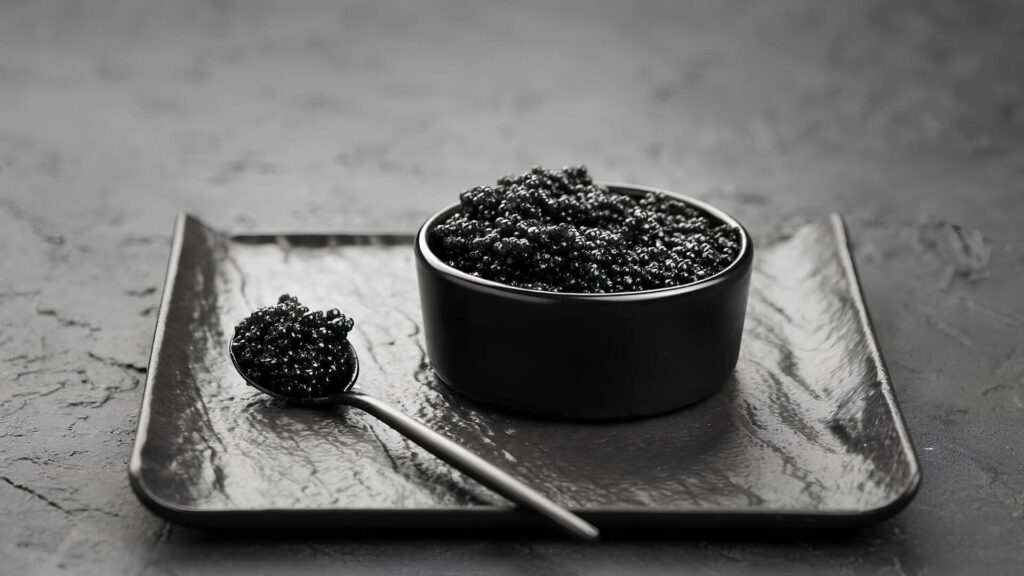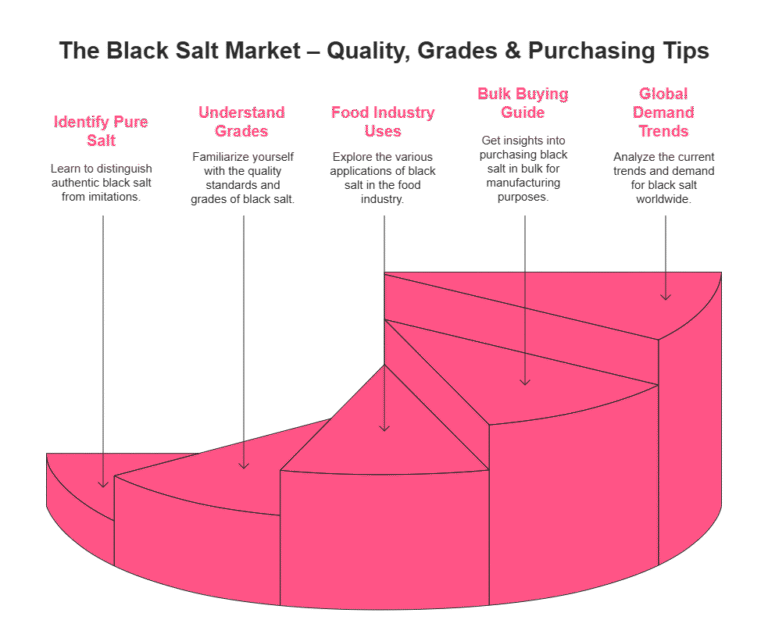Understanding the Black Salt Market – Quality, Grades & Buying Tips
- Zayan Rauf

Black salt, also known as Kala Namak, is becoming more popular in kitchens and wellness routines around the world. Its unique smell, flavor, and mineral benefits make it stand out. But if you’re new to it, you might wonder: how do I know if it’s real? What’s the best quality? And what should I look for when buying?
This guide will help you learn how to spot pure black salt, understand its different types, and make smart buying decisions.
Table of Contents

What Makes Black Salt Special?
Black salt comes from volcanic rocks, mostly found near the Himalayan region. It’s full of natural minerals like iron and sulfur, which give it a slightly egg-like smell and a tangy flavor.
People use it in:
- Chutneys, snacks, and spice mixes
- Health drinks and digestion remedies
- Vegan recipes to give food an “eggy” taste
Thanks to all these uses, more people are starting to use black salt every day.
How to Identify Pure Black Salt
With so many choices out there, how can you tell if black salt is real?
Here’s what to check:
- Color: It looks dark brown or reddish in chunks and turns pinkish when ground.
- Smell: It should have a mild sulfur smell, not too strong or fake.
- Texture: Good quality salt is slightly grainy and dry.
- Taste: It has a sharp, tangy, and slightly salty flavor.
Make sure to buy from brands that mention where the salt comes from and how it’s made. For example, Sobaan Salts shares clear details about its sourcing and quality.
Black Salt Grades and Quality Standards
Black salt comes in different grades depending on how it’s processed:
- Raw Crystals: Big, unprocessed chunks, often used for grinding or home remedies.
- Powdered Salt: Fine and ready to use for cooking.
- Premium Grade: Clean, fine powder made for high-end kitchens or packaged products.
Knowing these black salt grades and quality standards helps you choose the right one for your cooking or health use.
Read More: Does Black Salt Expire
Common Food Industry Uses for Kala Namak
Even though this is an informational blog, it’s good to know how the food industry uses black salt. Some common uses are:
- In vegan dishes to give an eggy flavor (like tofu scramble)
- In snacks and pickles for extra taste
- In detox drinks and digestion-friendly tonics
- In spice mixes and seasoning blends
These uses are why Kala Namak is becoming more popular worldwide.
Bulk Black Salt Buying Guide for Manufacturers
If you’re thinking about buying in larger amounts, here are some tips:
- Choose trusted suppliers like Sobaan Salts
- Ask for purity reports or mineral tests if available
- Pick the right grade depending on whether you need it for food, wellness, or skincare
Even casual buyers can use these tips to get better quality salt at a good price.
Global Demand for Kala Namak: What’s Trending?
The global demand for Kala Namak is growing fast. More people are switching to natural, unprocessed products. This trend is strong in the health, vegan, and wellness communities.
Black salt is now being used not just in cooking, but also in skincare products, bath blends, and more. As awareness grows, more countries are looking for trusted brands that offer real, high-quality black salt. That’s why names like Sobaan Salts are becoming more well-known for their quality and reliability.
Check Also: The Growing Demand for Himalayan Pink Salt in the Global Market
Final Thoughts
Understanding the black salt market helps you make better choices—whether you’re cooking, trying natural health options, or just curious. Now you know how to:
- Spot pure black salt
- Understand different grades
- Follow buying tips
- Stay informed about global trends
So next time you shop, you’ll know exactly what to look for. And if you’re seeking authentic, mineral-rich Kala Namak, Sobaan Salts is one of the trusted names in the market.
The global gourmet salts market, which encompasses black salt, was valued at approximately USD 3.2 billion in 2024, according to a recent report by Verified Market Reports. This valuation reflects the growing demand for specialty salts in culinary and health applications, with projections indicating continued growth. The figure is part of a broader industry analysis covering trends up to 2033, underscoring the market’s expansion. (Source: Verified Market Reports)
Share This Post
Article By

